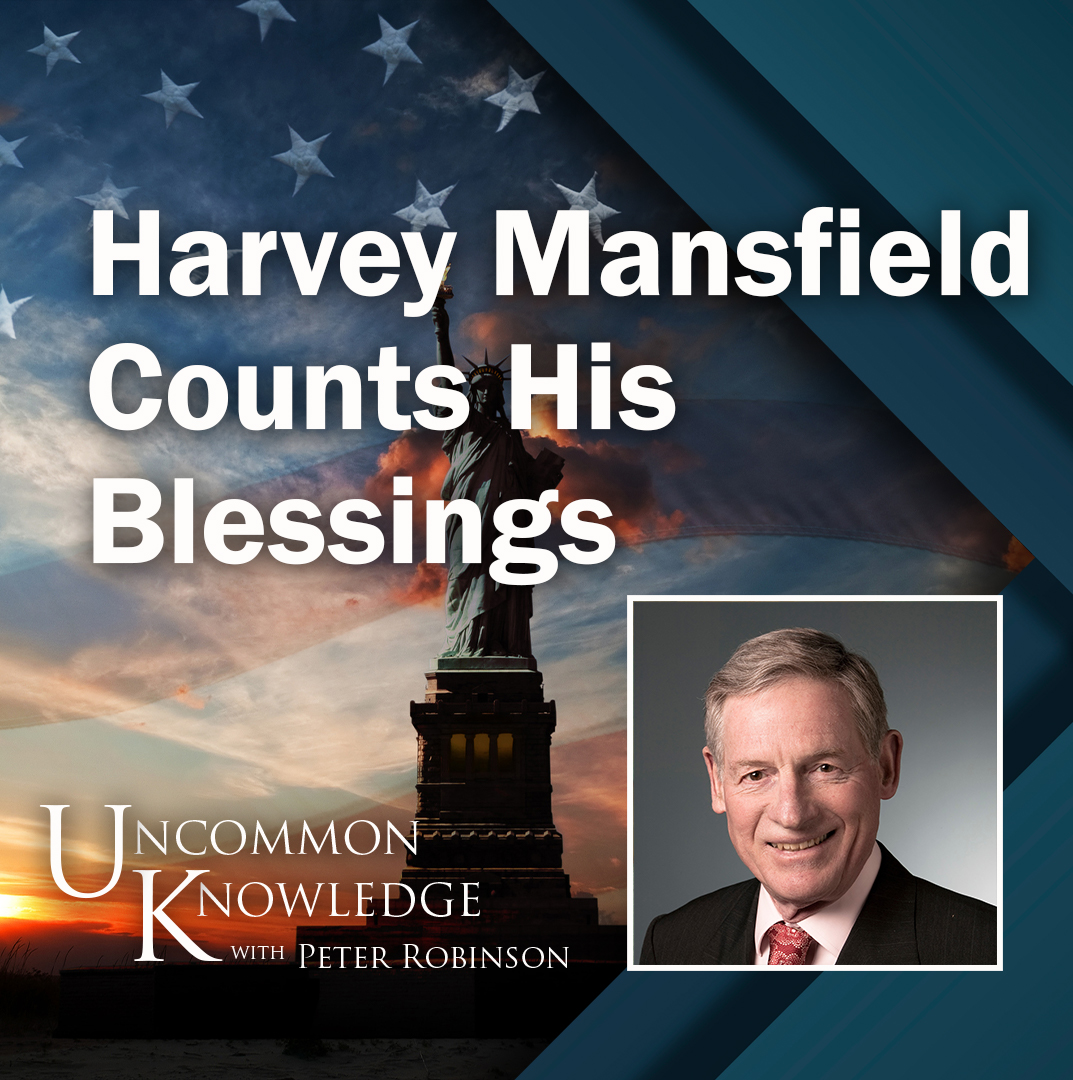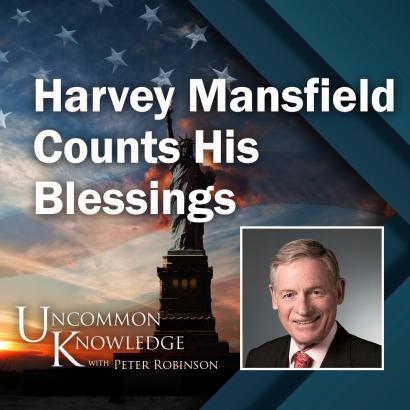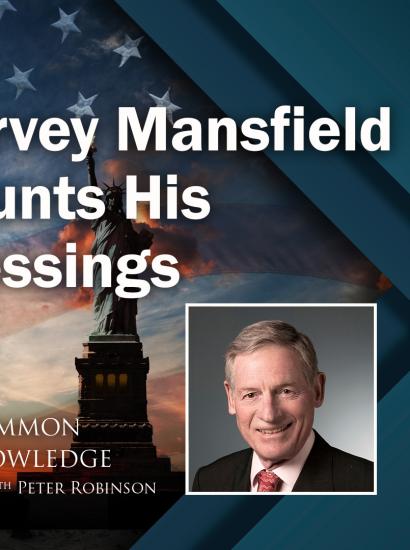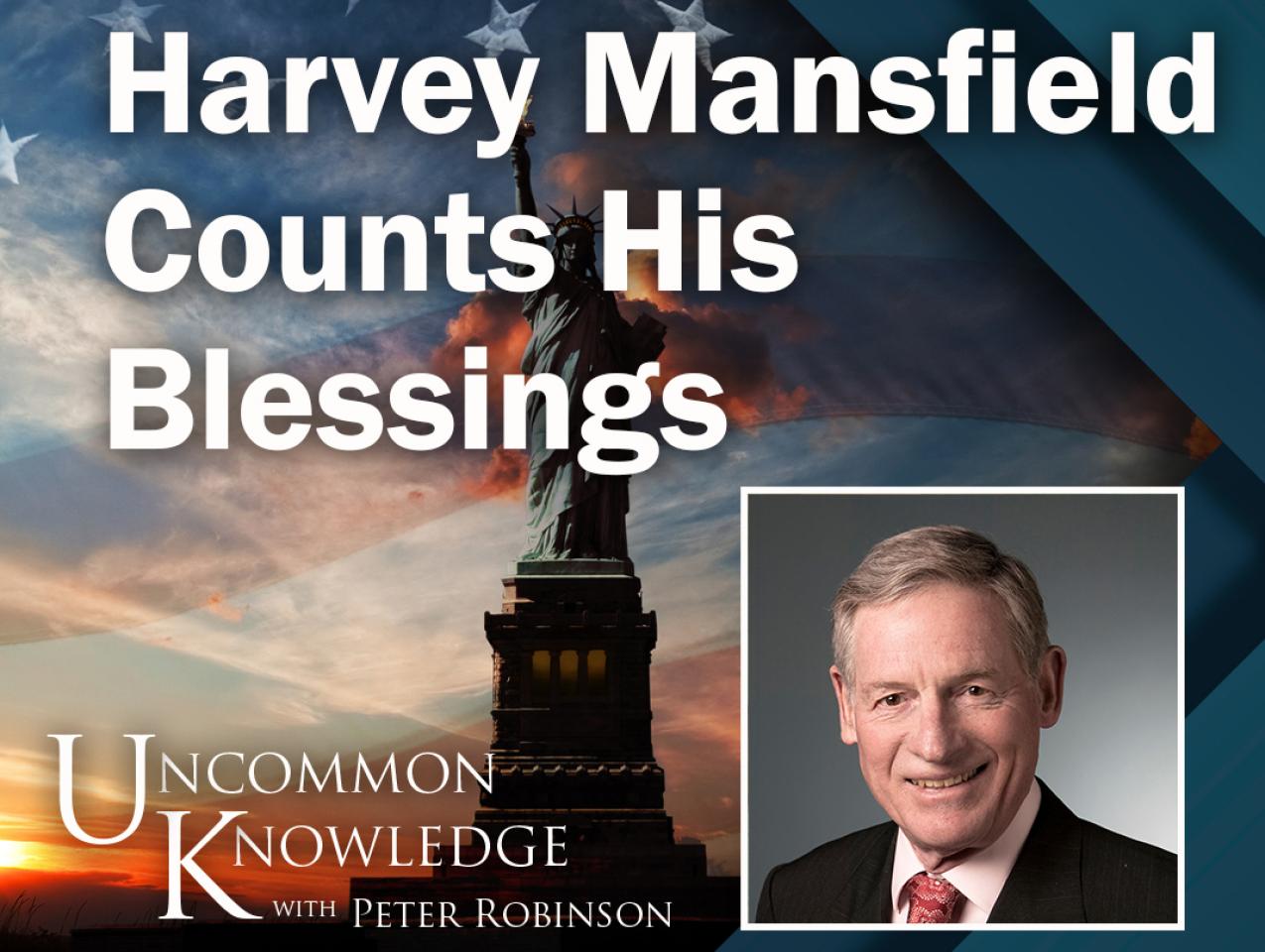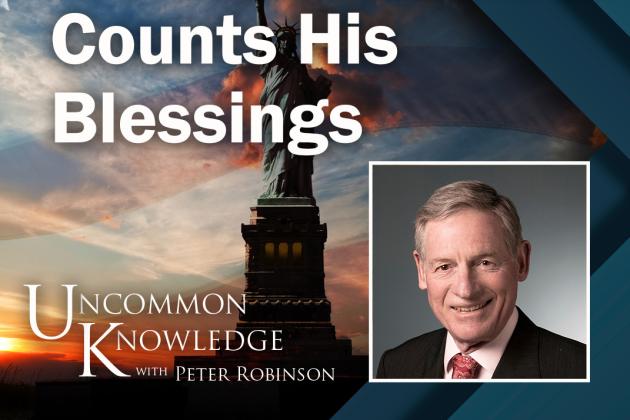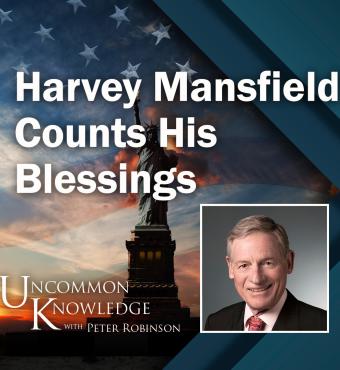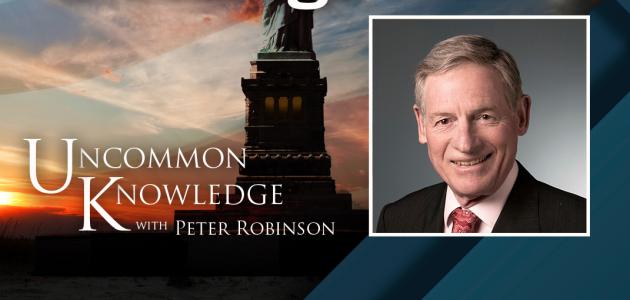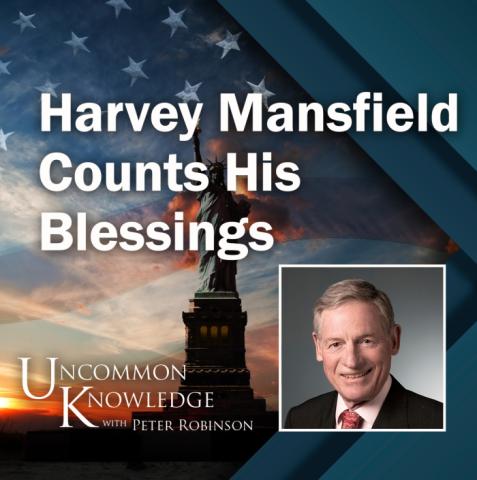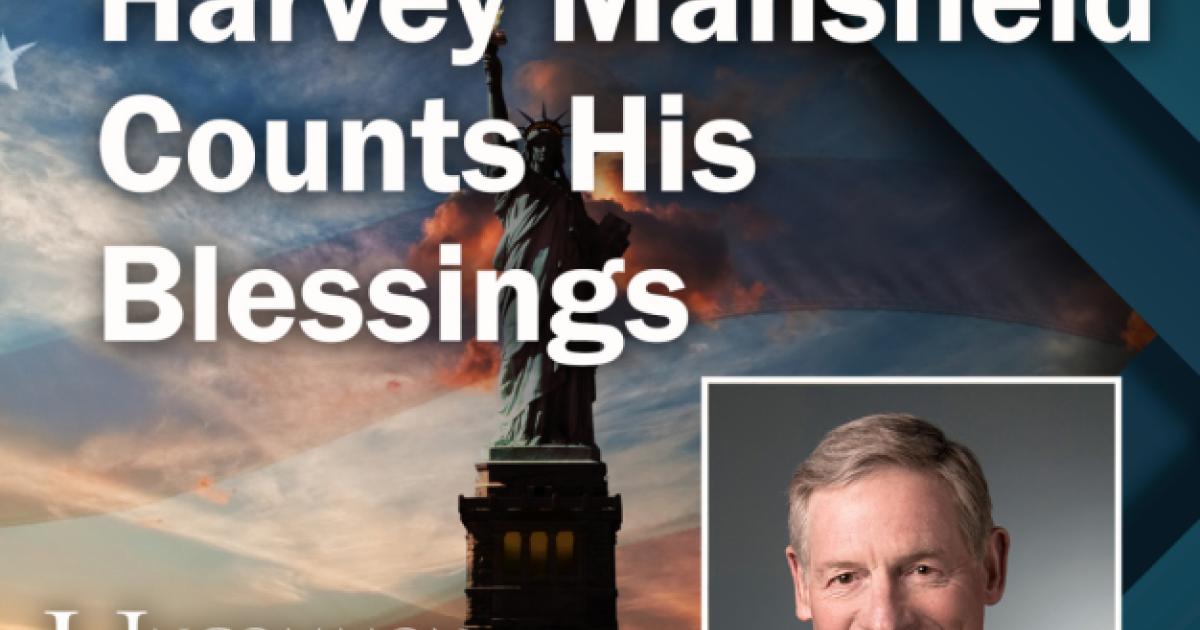- History
- US
The political philosopher Harvey Mansfield first arrived at Harvard University in the fall of 1949. He has remained at that august institution of higher education and is still teaching at age 90. In this special edition of Uncommon Knowledge with Peter Robinson, recorded in the Baker Library at Dartmouth College, Dr. Mansfield answers five questions about America today from his perspective of observing and writing about the country for more than half a century.
Recorded on April 15, 2022
To view the full transcript of this episode, read below:
Peter Robinson: The political philosopher, Harvey Mansfield. He arrived at Harvard University as an undergraduate in the fall of 1949 and has remained at Harvard ever since. For a man who has spent almost six decades studying the United States, five questions about America today. Harvey Mansfield on Uncommon Knowledge now. Welcome to "Uncommon Knowledge". I'm Peter Robinson. The political philosopher Harvey Mansfield enrolled at Harvard University in the autumn of 1949 and has remained at Harvard ever since. After receiving his undergraduate degree from Harvard in 1953, he received his doctoral degree from Harvard in 1962. The following year, in 1963, he joined the Harvard faculty. And earlier this very day, 59 years after joining the Harvard faculty, Professor Mansfield taught a seminar in political philosophy at Harvard. Harvey Mansfield has published more than a dozen books, including the standard edition of de Tocqueville's "Democracy in America" published in 2000, which he translated and edited with his late wife Delba Winthrop. In 2006, Professor Mansfield perhaps, published perhaps his most controversial book "Manliness." Joining me today from the campus of Dartmouth College, one of the few institutions that can condescend to mother Harvard Harvard legend, Professor Harvey Mansfield. Harvey, five questions. Here's, first, family and religion. And the big question here is do our underlying social institutions remain healthy enough to support self-government? From your book "Tocqueville: A Very Short Introduction," I'm quoting you, "In Tocqueville religion and family represent an indispensable supplement to politics that keeps it under restraint with the reminder of a higher and more intimate life than political life. Both religion and family are necessary, necessary to self-government." All right, we come to religion in a moment. First, family. This'll take another moment to set up and then I just leave it to you. In 1965, 2 years after you joined the Harvard faculty, Daniel Patrick Moynihan published his famous report, "The Negro Family," that was the correct word in those days, "The Negro Family: The Case for National Action", Moynihan, whom I, you no doubt knew, a Harvard man himself, spoke of, quote, "A massive deterioration in the fabric of society right under our prosperous noses." What had him concerned in 1965 was an illegitimacy rate among African Americans of 25%. Today, the illegitimacy rate among white Americans is more than 30% among Hispanic Americans, more than 50%, and among African Americans, more than 70%. And Harvey tells us that in the eyes of Tocqueville family is necessary for self-government. How much trouble are we in?
Harvey Mansfield: Considerable trouble. I would say yes, that's family. I knew Pat Moynihan. He was a colleague actually in the Department of Government.
Peter Robinson: Oh really?
Harvey Mansfield: That's right.
Peter Robinson: Oh, you worked--
Harvey Mansfield: And we had a lot of fun together. He was a great fellow. He was the only Harvard professor who ran for office in the Senate while being a professor, and he won.
Peter Robinson: And he won. It's difficult to forgive him for winning because the man he defeated was the lovely and impressive James Lane Buckley, Bill Buckley's older brother.
Harvey Mansfield: Uh-huh, I had forgotten that. But Moynihan makes you forget other people. His report on the family cited manliness on the, I actually referred to this report in my book on "Manliness", one of the problems of the Negro family, as was called then, was the place of the father and the lack of opportunity for manliness to show itself and exert itself. He spoke of the way a rooster needs to strut. So there were, maybe one, your, one's first thought of a family is love. And as you say, intimacy and hugging and being together, but there also needs to be a man at the, in the house, a man who can express and impart a sense of importance, that this family is something that's important. A man needs a sense of self-importance. That's a quotation from a woman, who I've just spoke to, one of the books I was studying for that book on manliness. And I think that sense of self-importance gets lost, and especially in the black family.
Peter Robinson: And is it is--
Harvey Mansfield: A legacy of slavery.
Peter Robinson: Sorry?
Harvey Mansfield: A legacy of slavery. That one of the worst things about slavery was that the master could take your woman for himself when he wanted. So your sense of being a man was altogether lost. And the recovery of that sense is, I think, in good part behind what we see now in, say, the excessive manliness, often criminality of black, young, black males, their desire to, not to be, here's one of the words they use, not to be dissed, their desire for respect, that's what they want and that's what they see they lack. And when they see this lack, they react very quickly. And this is maybe also what is behind the notion of systemic racism that you see things which are slights, and they may be small things--
Peter Robinson: Microaggressions.
Harvey Mansfield: If you're black. Yeah, microaggression. And it is something small, but you, you're not on a mood to laugh it off or to brush it off. So you get angry. Somehow our whole society has given itself over to taking offense easily. Too many take offense too easily. And I think this is in good part what's the trouble with our family life. And I don't know where it comes from, but--
Peter Robinson: Harvey, what about Charles Murray's argument, which he made way back in the '80s, that the welfare state displaces the father in families on welfare? Now on the one hand, that sort of makes intuitive sense. On the other hand, Moynihan notices a problem in 1965 when the welfare state is just barely getting off the ground. So it can't quite explain every, how much damage to the family? Do you buy any of that argument?
Harvey Mansfield: Yeah. Well, the other damage, the family comes from feminism, which was also not quite getting started in 1965.
Peter Robinson: Right.
Harvey Mansfield: But yeah. The beginnings were there.
Peter Robinson: No, you're gonna have to, I want everybody to know the name is Harvey Mansfield, send your letters, to have complained to him, but how on earth, you don't have anything to prove to anybody so you can say what you want, Harvey. But how does that argument go? How has feminism damaged the family?
Harvey Mansfield: Well, feminism says that a man is the same essentially as a woman. Has the same status, the same rights, nothing, there's nothing fatherly or paternal that's needed, a famous statement of, I think it was Gloria Steinem, that, "A woman needs a man like a fish needs a bicycle." And so that isn't even that funny.
Peter Robinson: No.
Harvey Mansfield: But it isn't true either. So I think that the independence of women and then the sort of rationalization of that independence through feminism has had a, I think, a good deal to do with the decline in difficulties in the family.
Peter Robinson: Religion. Harvey, I'm going to quote you again on Tocqueville. "For Tocqueville, despotism can do without religious faith, but freedom cannot. Though Americans do not allow religion to mix directly in government, he says, it should be considered as," and now you quote Tocqueville himself, "the first of their political institutions." Religion as the first of Americans' political institutions. All right, a couple of statistics. According to Gallup, the proportion of Americans reporting membership in a church, synagogue, or mosque, in 2000 70%, today 47%. Nones, the proportion of Americans who claim no religious affiliation, again, this is Gallup, Americans over 76 years old 7%, between 58 and 76 13, between 42 and 57 20%, between 26 and 41 years old 31%, and between 26 and 41, those ages, almost a third. Almost a third of young Americans claim no religion whatsoever. All right, I repeat it. "Despotism can do without religious faith, but freedom cannot." What do we do with this?
Harvey Mansfield: Those are disturbing figures, yes.
Peter Robinson: I'm offering you the opportunity to cheer us up, Harvey.
Harvey Mansfield: Right, I know. Well, yeah, let's see. From the standpoint of Tocqueville. Religion is not just a value; it's a higher value. It's something that makes you look to a power, which is above, which is stronger than you are. But religion is also within the realm of what he called civil society. It's not the work of government. So strongly as he believed that religion is a political institution, he also believed in the separation of church and state. America got started through theocracy really of Puritans, but that had to be corrected in the American Revolution at about that time. And most of the colonies abolished, established religion and instituted them, what amounted to separation of church and state. So it's more, it's not so much worship that he worries about or that he thinks will bring, bring republics and democracies, make them stronger, it's about what you think. The real danger for democracy intellectually is materialism. Democracy has a tendency toward materialism because people, having no authority over them, look around and find nothing and satisfy themselves with petty pleasures and immediate gratifications.
Peter Robinson: That's certainly been my plan.
Harvey Mansfield: Yeah . And those are, immediate pleasures are material, for the most part. And those material pleasures can lead you out of your political interest or concern into the sense that you are the victim of series of vast impersonal forces, which you can't do anything about. In a democracy, you feel, "Yes, I'm free. But I'm one among so many that I'm also weak." So materialism accentuates your sense of being weak. It tells you you are determined by causes other than yourself. So to combat that, you need a sense of what is spiritual. And so one can make a general sort of category of spiritual versus material. And we need spiritual for the sake of our self-control. So it's complicated. You have to think that there is an authority above yourself, but it's something that you accept for yourself and understand as something which gives you a sense of control over your future and your country's control over your future. So a sense of self-control is necessary for the health of self-government. And self-control comes with religion, the sort of self-appointed authority over yourself. So it's not so much a loss of piety that he's worried about, but a loss of the, among intellectuals, the loss of a sense of wholeness that can arise from putting yourself in God's place. God is above us, and He generalizes, and He also particularizes. Our politics, however, do one or the other. We generalize, we treat men as roughly similar, if not perfectly equal. That's democracy. Or particular rise, that's oligarchy or aristocracy. Certain people, the few, are more important, more interesting, more powerful than the others and that somehow deserves to be respected and rewarded. So your political thinking is much improved by any, doesn't require success, but any step in the direction of a divine point of view. So this is, I think, his view of, kind of an intellectualist view of religion. And that is what is lost as well now.
Peter Robinson: So what, so the notion of the divine, of God, on the one hand, it's complicated as you say, and also it seems to me it'd be, I'm grasping to sum it up, as if it's my job to try to sum up Harvey Mansfield and Tocqueville, but it feels like a paradox. On the one hand, it enforces a certain humility of outlook. But at the other hand, it enhances the meaningfulness of the political endeavor. What we are doing together, I'm humble before you because I believe there's somebody much smarter than both of us.
Harvey Mansfield: Right.
Peter Robinson: We're both limited, let's talk this over. Let's do the best we can. But at the same time, our joint project is meaningful because we are both the creatures of this remarkable something. We don't have to be too specific about it to proceed democratically. Is that roughly correct?
Harvey Mansfield: That's roughly correct. And then the political danger of religion is thinking that God is on your side.
Peter Robinson: Right, right.
Harvey Mansfield: So you have to get above that and you have to see that there are limitations to your side. Politically, liberals and conservatives need to understand that liberals and conservatives are going to continue to exist.
Peter Robinson: Yes.
Harvey Mansfield: And that liberals, I think, here have more trouble than conservatives in believing that they can, that they're stuck with their opponent. For, let's say, if not perpetually, as far as the eye can see.
Peter Robinson: So in a great big bumptious country like this, when coexistence is the only possibility.
Harvey Mansfield: Yes. And religion can help that it, it puts something above you, but it doesn't do it in a way that makes you think that God is your partner.
Peter Robinson: Right, all right. Next question, next big question for Harvey Mansfield. What are we to make, I suppose I could get in trouble just for putting it this way. What are we to make of gender confusion? There, that's as far as I'm gonna go. I'll let you say the really outrageous things. Two quotations. This is Harvey Mansfield in his 2006 volume "Manliness." "Our gender-neutral society needs to readopt the distinction between public and private. In public, our society should be gender-neutral; in private, not. Women should be free to enter on careers but not compelled to do so, yet they should also be expected to be women." I'm gonna duck the brick bats as they can flying at you. "And men should be expected to be not merely free, but manly. A free society cannot survive if we are so free that nothing is expected of us," close quote. Here's President Biden couple of weeks ago. "To everyone celebrating Transgender Day of Visibility, I want you to know that your president sees you." Okay, where are we, Harvey? First of all, let's decock to your statement because that was quite a complex paragraph as well. "In public, we should be gender-neutral." That's an achievement. The notion that women should be completely free to enter upon careers and, all right, that's what you mean.
Harvey Mansfield: It is an achievement. And we get the advantage of women's intelligence in a way. We take advantage of that great resource, which has been underutilized or held down partly by feminine modesty, but also by male obtuseness.
Peter Robinson: All right. "Women should be free to enter on careers," thus far, Dr. Mansfield is controversial, "yet they should also be expected to be women." You'd better explain yourself.
Harvey Mansfield: Society requires expectations. I think that's something that conservatives understand better than liberals. Conservatives believe in conventions, in good and sound conventions. Mores, Tocqueville's, was the term, and then mours on French, was the word. And these are not laws, but they're, they fill that gap between government and individual, by bringing us together in such a way that we're not surprised and we don't always have to improvise when we meet someone of the, I'm gonna call it the opposite sex.
Peter Robinson: Through outrageous manual, right.
Harvey Mansfield: Yeah, right. And so we need expectations and none more than about the differences between men and women. Men should be more courteous and more manly, and women should be more modest and more gentle. And we don't need two sexes that are violent and aggressive.
Peter Robinson: Okay, so now there are a couple of questions I'm required to ask. One is, are you arguing that women and men are naturally different, that these differences are rooted in different physiology, different, I don't know, different genes? Or are you saying that for the good of society, that for the, that it is simply a superior way to live if we retain some notion of, forgive me, I don't know what other term to use, chivalry? Some think some distinction between the sexes that all of us understand, we're stuck with it and we ought to admit it and live with it as best we can, or we should aspire to it. Which do you mean?
Harvey Mansfield: We should aspire to it, but we also have natural inclinations. I think that that help us to aspire to it. It isn't just an imposition by society. These aren't just stereotypes. Most of the stereotypes regarding sex are correct, by the way. So I found on. That's in the literature on sex differences of which there's a good deal. One finds really nothing to support the feminist contention that men and women are essentially different and--
Peter Robinson: Essentially it's the same, right.
Harvey Mansfield: I mean, essentially the same or similar. So most people understand that. And the layman, this is what the experts will tell you, this is the layman, understand the differences between men and women pretty well.
Peter Robinson: You have to be an intellectual to believe there's no difference?
Harvey Mansfield: You do. You do. And a certain kind of intellectual, a Marxist intellectual, like Simone de Beauvoir.
Peter Robinson: All right. Harvey, here's another big question. Well, actually before we leave this differences between men and women, what has happened? Something's happened in the last 18 months or so, and maybe, well, we get a supreme court decision saying that same sex marriage, and there were a lot of conservatives who said, "Fine. Fine, fine, fine. Let same sex couples aspire to the same kind of domestic devotion that's available to heterosexual couples," that that's the kind of, but then we get a kind of transgender fever almost in which you have the president of the United States, whose parents raising young Joe Biden as a Catholic family in Scranton, Pennsylvania, could scarcely have conceived that their son might one day say, "To all of you celebrating Transgender Day of Visibility," what happened?
Harvey Mansfield: We've gone crazy on that point that. Yeah, this goes beyond feminism. Feminism was supposed to help out women. But they did so in such a way that they couldn't define a woman. And now, that lack of definition is coming back to bite them. It's going to, it's attacking women's sports.
Peter Robinson: Right. Title IX is meaningless unless women are women.
Harvey Mansfield: That's right.
Peter Robinson: There's no, all right, all right.
Harvey Mansfield: Yeah, all that is correct.
Peter Robinson: And can I ask, do you think this is something that, blow over is not the right word because there are arguments, there's an intellectual underpinning to this, but is this the sort of thing where the, where common sense will prevail over time? Does this worry you? Or do you think, "Oh, this is just a, this is temporary, we plead temporary insanity as a nation?"
Harvey Mansfield: No, it does worry me because it is possible for intellectual delusion to defeat common sense, at least for a long time. On the other hand, there is that famous statement that nature, you can throw it out the front door with a pitch fork, but it'll come in at the back door.
Peter Robinson: All right. Question, I think we're up to question four here. National conservatism. Does the country need a new kind of conservatism? All right, as you well know, there's a debate taking place on the right or among conservatives, or the center-right, however you'd like to define it, and certain conservatives insist we need a new conservatism. Christopher DeMuth, writing recently in the Wall Street Journal, and Christopher DeMuth is one intelligent, articulate person, quote, "When the American left was liberal and reformist, conservatives played our customary role as moderators of change. When the leftward party in a two-party system is seized by radicalism, the conservative instinct for moderation is futile. Conservatives need to move to nation rebuilding." All right, the principles that the founders made explicit in the Declaration and the Constitution, the explicit bits, are no longer enough. We now need to make explicit aspects of the founding that they were able to take for granted, a certain sense of common nationality. Borders, they didn't have to worry about borders of course. Who knew where the Western border was at that stage. Somewhere on the other side of the Allegheny Mountains. English, it never crossed anybody's mind who signed the Declaration, that there might be a pressure on English as a common language. So does this make sense to you that we, or, so that's one aspect I think of the national conservative impulse that there are aspect, we're not trying to reject the founding, we're trying to draw out what is implicit and that we now need in our current day to make explicit. But then you've also got in Chris DeMuth a second impulse, I think, which is we need to fight back. The left is playing fair, moderating, slowing the, that doesn't work anymore. The left is now in the mood to turn the country upside down and we cannot prevent it. So what do you make of what I take to be two impulses in national conservatism?
Harvey Mansfield: Well, I, too, like and admire Chris DeMuth very much. But I worry about the national or integrous or common good conservatism. But I do agree that there's a problem. And you could say that the problem of the border is the same as the problem of the same sexes, that we don't know how to make definitions. We've stopped believing in essentialism. Whereas common sense tells you that every country has a border, the intellectual delusion, like there are no definitions tends to deny this. There isn't even a difference between an alien and a citizen that deserves to be respected. And so somehow we need to recover our essentialism, but at the same time one should hesitate to constitutionalize our differences. And we have a constitution which is supposed to unite us within which both of us, both parties, have to live. So I come back to my point about the importance of liberals and conservatives, expecting that each of them will, the opponent of each of them will survive. And that means that yes, we have to fight. But yeah, what about the fact that people don't believe in the nation or that people have a different view of the nation? That when that gets to be dominant because a president like Biden is elected, that's worrisome and it's something to oppose but I don't think it's anything fundamentally new.
Peter Robinson: Oh, you don't?
Harvey Mansfield: No, I don't think that it requires a rethinking of that sphere of civil society, which is between government and the individual.
Peter Robinson: All right, so that, one of the many attractions of talking to you is that you've seen a lot, Harvey. So Harvard in 1949 when you go up to the place as a freshman, and indeed Harvard in 1963 when you become a member of the faculty is one Harvard. And by 1968 and 1969, we have a different institution. Or at least an institution, let's say, from Harvard yard, you can still hear the screaming and the rioting outside in Boston that's taking place in the '60s. And you don't, the country held what was, the center did hold, the constitution contained all of that, ferment in even, sorry to say, violence. In some ways, in many ways, the '60s is actually even a creative moment. We get the civil rights movement, which is a, one of the glories of American history. And having lived through that, Harvey Mansfield does not look at the present and say, "Uh-oh, this is unprecedented."
Harvey Mansfield: Well, you mentioned the late '60s and that gives me pain because I lived at Harvard to write through the late '60s. And that was--
Peter Robinson: That was rough.
Harvey Mansfield: That was rough, it was disgusting. That's the word I would use. And that's the emotion which I felt. So yes, conservatives have had trouble on the culture issues. But I like a remark that Yuval Levin made recently. There's the culture issues and then there's the economic issues. And the conservatives think more about the culture issues than the economic issues, which is the ones that they're losing on. Whereas the liberals, facing those two categories, care more about the economics issues where they are losing and take for granted with cultural issues where they are winning. So both sides think they're losing. And this is a way that our hyper-partisanship adds fuel to our hyper-partisanship that both of us are highly dissatisfied. So conservatives should look at this at the prosperity and more than comfort the rather high-living that our country enjoys, especially by our immediate competitors. We somehow have a lower average IQ than the Scandinavians and the Germans. But we get a lot much, we get much more from our economic system than they do.
Peter Robinson: And, Harvey, does, is wealth a solvent of character and common sense? So here's what I mean by that. You were, I guess, 18 at 1949, typical age for a freshman, you'd lived through the Second World War, your parents had come up during the Depression. In some basic way, every member of your generation understood the stakes. You now teach, while you were teaching, were you teaching undergraduates earlier today? Was it undergrads or graduate seminar?
Harvey Mansfield: It was undergraduates, yep, yeah.
Peter Robinson: All right, so you've got a room full of 18 to 22-year-old Harvard students, who've known nothing but prosperity. What was it, the 2008 financial crisis, nothing by comparison with the Great Depression. And does that, in some way or another, does every generation to relearn the virtues necessary to pursue democracy? Does every generation have to experience the stakes?
Harvey Mansfield: Yes, it certainly does.
Peter Robinson: It does?
Harvey Mansfield: Yes. And we are certain, and I think now we are experiencing those stakes. And you see that in the clash between the woke and the conservatives. The woke takes things for granted.
Peter Robinson: Like wealth.
Harvey Mansfield: Like wealth.
Peter Robinson: Like health.
Harvey Mansfield: Like health. Yeah, and I mean, personally, you talk about, myself when I was a kid, now I'm 90, but thanks to our wealth and certain interventions, medical interventions that I've enjoyed. I feel pretty good at 90 years old.
Peter Robinson: I should just let everybody who's watching this know that not only did you teach a seminar in Cambridge today, drive all the way up here, but when you arrived, there was a power outage and you had to walk up three steps, three flights of stairs, you're doing fine at.
Harvey Mansfield: All right, that's not, yeah, thanks. That's nothing, but yeah, you're right. People often behave better when they're under pressure, under stress, but we are under stress. We conservatives especially. We have the pleasure of losing and it gives us something to be worried about and to think about.
Peter Robinson: Next big question, mild despotism. Again, from your introduction to Tocqueville. "The greatest danger to democracy," the greatest danger to democracy, "comes out of democracy. Instead of people's sovereignty, Tocqueville warns of," and now you're quoting him, "the immense being of big government and a new mild despotism resulting from that government." All right, we now live in an America in which government at all levels absorbs something like 50% of GDP, half of what we make they take, in which federal agencies have absorbed much of the legislative function of Congress, in which federal research grants and other subsidies make up a third or more of the budgets of our major universities, that wasn't the case in 1949 at Harvard, in which a president, who attempted to confront the administrative state, I am slyly introducing the subject of Donald Trump here for you, Harvey, found himself denounced by the universities and the press and impeached not once but twice. Have we succumbed to mild despotism? Was Tocqueville warning about the deep state that Donald Trump reeled against?
Harvey Mansfield: He was warning about what he saw then. And we're seeing the same thing now. So he had this wonderful foresight. But he also listed things that are good about our country, and that there are ways in which we combat this mild despotism. And he ended it with a question, whether it will continue. I think it is a challenge for each generation that comes. But in response to your questions, I think we need to count our blessings.
Peter Robinson: All right. Let me try, this is as dark as I will get.
Harvey Mansfield: All right.
Peter Robinson: And you being you, I'm pretty sure you'll swat it away. Dostoevsky. "The Brothers Karamazov," you know exactly where I'm going, the legend of "The Grand Inquisitor," in which we have the grand inquisitor saying to Christ, "You're all wrong. These people don't want freedom and redemption." And here's "The Grand Inquisitor." "Receiving their bread from us," the technocrats, "Receiving their bread from us the people will clearly see that we take the bread from them to give it back to them and they will be only too glad to have it so as it will deliver them from their greatest anxiety and torture, that of having to decide freely for themselves. Never was there anything more unbearable to the human race than personal freedom," close quote. Sustaining a free society is too much to hope. We human beings cannot bear it.
Harvey Mansfield: Tell that to the Ukrainians.
Peter Robinson: That's it. That's that question taken care of. All right, last big question here.
Harvey Mansfield: Right.
Peter Robinson: Universities. Again, a couple of statistics, 2020 study by the National Association of Scholars. Registered Democrats outnumber registered Republicans among university faculty by a ratio of 8.5 to 1. In election cycles between 2015 and 2018, university faculty who donated to Democrats outnumbered university faculty who donated to Republicans by a ratio of 94 to 1. I'm suspicious that one may be you. According to a faculty survey by The Harvard Crimson, the percentage of Harvard faculty that called itself liberal or very liberal 78%, the percentage of Harvard faculty that called it self conservative 3%. That is you, and maybe two or three of your friends.
Harvey Mansfield: It wasn't me because I don't answer surveys.
Peter Robinson: Oh, right. So let's say it's 3.5%. We'll toss you in.
Harvey Mansfield: All right.
Peter Robinson: Okay, so universities are just overwhelmingly to the left. Now, when I was an undergraduate here at Dartmouth, conservatives used to say, "Don't worry. When the '60s generation begins to retire, all of this will correct itself." They've retired, it's gotten worse. Argument one. Argument two, then conservatives said in the '80s and '90s, "Don't worry. When the kids graduate, they'll get jobs, they'll start paying taxes, they'll need to scrape together down payments for their first homes, they'll wanna raise families. They'll encounter reality and they'll become conservative. Or enough of them will become conservative." Both of these arguments sound plausible and they both seem to be wrong.
Harvey Mansfield: Yes, right.
Peter Robinson: The faculty overwhelmingly left even though the '60s generation is retired. And younger generations are farther to the left than the older generations. The kids don't correct themselves or don't correct themselves in anything like a decade. All right, so how come those arguments are wrong? They sounded so plausible to me.
Harvey Mansfield: They do sound plausible, and they have been wrong. So ideas have consequences, I think that's a conservative saying. And education really does have an effect. And so we're--
Peter Robinson: So you mean that what you've been doing at Harvard all these years sticks?
Harvey Mansfield: Well, that's right. That's right. I have a few, guess I do, a few graduates that maybe won't be like most of them. But you're right. Now you're getting me indignant and a little bit more pessimistic, because I think our universities are in very bad shape in this regard.
Peter Robinson: And where's the mechanism for self-correction?
Harvey Mansfield: Politics. You can see that, for example, Harvard got charged $143 million in tax on its endowment by, put in there by the Republicans. Harvard has become a figure of fun and it's the most prestigious institution with such ill repute.
Peter Robinson: So that's--
Harvey Mansfield: And that's not good. It politicized itself. And it's perhaps going to have to start paying for it. But I cannot see that it's present policy of sort of replicating the Democratic National Convention at every commencement is in any way satisfactory or in its interest to maintain.
Peter Robinson: Let me offer three models for reforming the institutions or at least for giving the center-right, conservative, giving them breathing space. All right, here's model number one. Establish little conservative Montenegros, Robbie George's Madison Program at Princeton, which is a magnificent thing, but it's a gulag. Harvey Mansfield, single-handedly, you have filled American academia with such with what conservatives and political science departments as do exist. That's one model. The other model is forget about the old institutions. Go found the university of Austin, where this billionaire Joe Lonsdale is putting up money to found an entirely new university. And the third model is give up on the research institutions. That's where the corruption is. Let's go back to little liberal arts institutions. There's St. Thomas Aquinas, a lovely Catholic college in California, or look at all the little institutions that still exist. that dot New England and nobody even speaks of because Harvard so dominates. All right, so conservative Montenegros, Monte Carlos perhaps, entirely new institutions, or give up on Harvard and Stanford and all the other monstrous institutions and try to find some, concentrate on Hillsdale or St. Thomas Aquinas. What do you think?
Harvey Mansfield: Now, I'll answer like a politician. Let's do all three. We shouldn't give Harvard to the other side. I'm too much of a Crimson deep down to want to do that. So don't give them Harvard. At least save that one, and maybe Dartmouth too. Manly Dartmouth, the Dartmouth Indians, the Dartmouth of Yore.
Peter Robinson: Bill Buckley once, William F. Buckley, a Yaleman, I've always thought of this, once he was telling he had come back from a dinner party at which he sat next to a very prominent Yale alum. And the Yale, Bill had tried to involve him in some intrigue or other to recapture some piece of Yale University. And the alum, to Bill's shock, had said, "I'm all Yaled out. I'm just done." And Bill said, "That's against the rules." That's the way you feel too. We're not allowed to give up on the institutions.
Harvey Mansfield: Yeah, that's right. I thought of a fourth thing that we can do.
Peter Robinson: What's that?
Harvey Mansfield: Go to the non-college vote, which we've been doing, we conservatives and Republicans. The working class--
Peter Robinson: You mean to say that Donald Trump was onto something?
Harvey Mansfield: Yes.
Peter Robinson: We won with highly educated. We won with poorly educated. I love the poorly educated.
Harvey Mansfield: In that respect . That's right.
Peter Robinson: All right, here's my last question, Harvey. And again, this is the pleasure of talking to a man who's seen the rise and fall of empires. 1970s, stagflation, the collapse of national morale with the defeat in Vietnam and Watergate, the erosion of our position in the cold war as the Soviets advance, they take a coastal fleet and make it into a blue water navy, they advanced in Africa and South America. And then in the 1980s, the very next decade, we get economic expansion, restoration of national morale, victory in the cold war. From 1979 to 1989, we go from the national humiliation of the Iranian hostage crisis to the fall of the Berlin Wall. That is a stunning national revival. Family, religion, the universities. Are we capable of another such revival today?
Harvey Mansfield: Yes, I guess you're asking whether Ronald Reagan was an accident or not.
Peter Robinson: I suppose that's what it comes to in a certain sense. Was he in, of course we have the, each human being is, in a certain sense, an accident, unreproducible, but was he a product of the constitution? Did something happen in the 1980s that the, that wouldn't have surprised Tocqueville or the founders, and can it happen again?
Harvey Mansfield: Well, he was a man that we found and elected him, and he was a consummate politician and a man of principle, and a charmer. Those are three things we could look for again. And I think the opportunity is open.
Peter Robinson: The job has not been spoken for.
Harvey Mansfield: Yeah, the job has not been filled.
Peter Robinson: All right, last question. If two students, 18 to 22-year-olds, can you sum up why the United States of America is still worth studying and fighting for?
Harvey Mansfield: We are trying to do the most difficult thing there is to do, which is us to build and keep a successful republic, a successful experiment in self-government. Human beings don't have instincts. We're left free by nature to, and many things are left open to us, puzzles and mysteries and so on. So we have to find our own sense of government, and that's what America's about and that's what it's doing and I think, and hope it will continue.
Peter Robinson: Professor Harvey Mansfield of Harvard University, thank you.
Harvey Mansfield: My pleasure.
Peter Robinson: For "Uncommon Knowledge" and the Hoover Institution, shooting today from the campus of Dartmouth College in Hanover, New Hampshire, I'm Peter Robinson.







